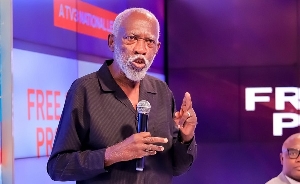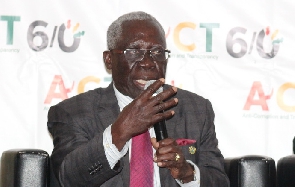Nana Akwasi Twumasi
Auntie Adwoa, as she was affectionately known, was born in the 1940’s in Sekondi-Takoradi, but she was whisked to Accra on the wheels of marriage. She was the kindest, altruistic and decorous person to ever walk the Earth, according to those who knew her intimately. Auntie Adwoa, even well into her 60’s, would address any male figure as “me wura” (translated “my lord”), irrespective of his age. In her household, she was the first person to wakeup and the last person to go to bed. As hardworking and sacrificial as she was, she lived in abject poverty. Her husband often furnished her with daily remittances, which were substantially less than what she would need to cook for her family. Without complaining, she worked hard to supplement the remittance and cooked for her family and the needy who lived next door. To add to her list of problems, she was also barren. The issue of fecundity caused a rift in her marriage, and it was also the source of feuding with her husband, who, resultantly tagged her “useless.” Mired in poverty, she always packed her belongings in empty flour bags anytime she was forced out of her marital home by “separation.” Despite being mistreated, auntie Adwoa always longed for her husband, because she was raised to believe that divorce was wrong. These separations culminated in a divorce in the 70’s. In the late 70’s she reunited with her husband, and they lived together again, without any significant change in her husband’s attitude toward her; her husband passed away in the mid 90’s. Even though the entire world seemed to be at odds with her, auntie Adwoa managed to exude strength, life and character. One thing that auntie Adwoa relished more than anything else was raising the children of her friends and relatives who were financially strapped, even though she wasn’t doing any better financially. She found this very fulfilling, her life calling, in fact — her insignia. She raised more children than a couple could bear. Auntie Adwoa’s generosity, however, was never reciprocated and she died a poor woman when she suffered a stroke, probably a complication from her longstanding diabetes. After her death, those who knew her, including her foster children, gave her an expensive burial ceremony. Using this true story as our backdrop, does it make sense to shower our loved ones with our financial resources when they are alive or when they are dead?
The living need clothes, food, shelter and all the essentials of life that money can buy. The dead, in contrast, need a wooden box and a 6ft deep hole. As simple as this may appear, we sometimes have our priorities misplaced when it comes to helping our friends, our families and our acquaintances whose persistent cries for help get our attention only after they are dead. Friends and families sometimes watch nonchalantly while their loved ones live in deplorable conditions. The only time they show concern is after these loved ones are dead. Splurging our financial resources on the dead is analogous to putting spinach in front of a starving lion. Of what use is our generosity to the dead? Auntie Adwoa could have lived many more years if she had gotten adequate medical attention as well as prophylaxis against potential complications of her chronic disease. A decade earlier, she lost one of her legs to amputation due to her diabetes, which is further evidence that she may not have gotten good medical care. Evidently, everybody in her life, including those who have become who they are courtesy of her munificence, was minding his or her own business until death broke into her body and robbed her soul. After reality set in, the question obviously shifts from “when will I have excess money to help auntie Adwoa?” to “what could I have done to prevent auntie Adwoa’s death?” This is a problem that has befallen some of us, and it will continue to happen if we don’t change our attitude toward our families, our friends, and our acquaintances. As Ghanaians, some of us are preoccupied with being charitable only when it will earn us public recognition. Thus, we fail to help those close and dear to us; but in the event of their death, we buy expensive caskets, expensive suits, and expensive jewelries to bury them in. If we could not buy our loved ones food when they were starving, what do we hope to achieve by burying them in $700 suits? Would it send them to heaven or would it provide them with the “requisite” luxury in the afterlife? Would burying our loved ones, who couldn’t afford a sachet of rice, in a $5000 gold-plated casket do them any good? The age-old adage that “we came into the world with nothing and will leave it with nothing” couldn’t be more appropriate in our discussion. We live in a physical world and our loved ones need physical necessities to sustain them while on earth. After they are dead, their souls depart for the afterlife, so whatever luxury items we use to adorn their lifeless bodies or put in their caskets will be in their graves till thy kingdom come—that is, if no criminal gets to them before we regain our sanity.
Without a doubt, the Akans, especially the Ashanti tribe, is well known for funeralizing their relatives in such opulence that one is left to wonder if they know they are in a Third World country. Ashantis bury their loved ones with diamonds, gold, and other luxurious items, in addition to spending copiously on their funerals. Could these luxury items that accompany a lifeless body to the grave be a source of financial help to the children and spouses left behind? Yes, of course! Ironically, at the end of the day, the organizers of these luxurious funerals would rely on public donations to offset their expenses. If we have to rely on public charity to pay for our ostentatious funerals, don’t we at least see there is something wrong? Truly, Ghanaians are charitable, especially to the dead; however, the reason for our charity, in some cases, is for public recognition. Recently a friend of mine told me how he and his friends are unhappy with our new currency. Why? Because the 50 Cedis they donate at funerals these days doesn’t exude the same luxury as 500,000 of the “old Cedis,” when their donations are announced at funerals. Even at funerals, we can’t seem to let the dead get the attention they deserve. Moreover, at these ostentatious funerals, the relatives of the deceased use this opportunity to cash in. It is a common practice for Ghanaians living in the Diaspora, for instance, to have multiple funeral ceremonies of one deceased person to make money off of a dead relative they may not have given a damn about while he/she was alive. Before anybody attempts to wring my head off for the latter statement on the grounds that there were multiple funeral ceremonies of the late Michael Jackson, I must state explicitly that there were many memorials of the late Pop icon, but just one funeral of him. For the sake of argument, let’s just assume Michael Jackson had multiple funerals, and let’s ask ourselves the following questions: 1) Was Michael Jackson’s funeral ostentatious even though he was one of the richest musicians to ever live? No. 2) Did Michael Jackson’s family rely on public donations to pay for these “funerals”? No. 3) If Michael Jackson had been an Ashanti or a Ghanaian, would we have seen more than what we saw at his funeral? Absolutely— hundredfold! In our case, because we are so consumed by greed, the temptation to profit off our deceased relatives takes precedence over morality. In fact, having more than one funeral for a deceased person is ridiculous enough, but to do it for money is just despicable. For the record, this is not just an Ashanti “problem” but a national “problem,” since all the other tribes are catching up to this practice.
If, indeed, our current way of funeralizing our loved ones is our futile attempt to show the world that we are civilized, then, of all people, we are the most to be pitied. Perhaps, it wouldn’t be a bad idea to revisit what our fathers and grandfathers did years back. May be it will not be farfetched to suggest that we adopt funeral traditions from countries that we are already trying so hard to emulate. Since the world is a global village at the moment, perhaps, we can adopt traditions that will further our development as opposed to adopting ones that make us look pitiful in the eyes of foreigners e.g., Valentines Day, striving to speak like Americans in Ghana, Gangster rap etc. In his excellent article titled Obama's Visit As A Signifier Of Ghanaians 'Colonial Mentality,' Akurang-Parry, Ph.D., remarked, “No society is static. In fact, change is a part of the human condition. Today, the processes of diffusion of innovations, ideas, cultures, etc. have been made easier via globalization, technology and rapid travel. What is wrong is our collective failure to look deeper into our ontological pot so that we can retain what would make our society more workable” (Ghanaweb feature article, 2009-08-26). To paraphrase his argument, we can revisit the manner in which our forefathers funeralised their loved ones, which was characteristically devoid of ostentation. Or we can simply adopt traditions from foreign countries. In the American society, for instance, the rich don’t spend as much on funerals as some of the poor in our societies — that is, relatively speaking. Why should the funeral of a person in a Third World country, such as Ghana, be relatively more expensive than some of the rich people in the United States? It is no news that some of our funerals are so extravagant that attendees are sent away with pre-packaged meals. In some of our funerals, I understand, people are hired to mourn and wail over the dead, as if an effort is being made to announce to the world that all the surviving relatives of the deceased have dysfunctional vocal cords and lachrymal glands.
It is my firm conviction that we must honor the dead by funeralizing them in a beautiful and respectful fashion. However, this does not mean we should bury them in 24-carat gold-plated caskets; this does not mean we should bury them with foreign currencies or pay others to mourn and wail over them; this does not mean we should serve expensive alcoholic beverages to attendees who donate the most amount at the funeral ceremony; this does not mean the organizers should have pre-packaged meals for all attendees to give the funeral a touch of opulence. Funerals, in my view, should be more about the dead and surviving relatives, and less about the attendees and greedy people who want to profit from the ceremony at all costs. If anybody wants to donate to support the family of the deceased, it should not be on the basis of expensive drinks offered to him/her or respect accorded him/her among the attendees, but it should be about ones willingness to help the surviving spouse and children left behind. More importantly, we should be charitable to our loved ones when they are physically here with us, not after their souls have departed for the afterlife. Succinctly put, splurging on the dead would not be enough to make up for what we failed to do for them while they were alive. We may not have the financial wherewithal to help all those close and dear to us, but that should not preclude us from helping those we could. Truth is, even after the death of loved ones whom we could not help we would, by virtue of our conscience, donate money for their funeral, regardless of our financial standing. If that is the case, then it should be our collective resolve to help our needy loved ones, one Cedi at a time, if that is what it takes. By electing to be charitable to our loved ones after their death by burying them with diamonds, gold, expensive clothing, in addition to having ostentatious funerals etc., are we not depriving their surviving relatives of good resources that can better their lives? Since the dead cannot tell the difference between a piece of wood and a diamond, by engaging in such acts, we are not only depriving needy relatives of good resources, but we are inadvertently enriching grave robbers.
** Dedicated to all the auntie Adwoas of our great nation who are making a difference in the lives of our children in spite of the fact that they’ve never tasted the joy of childbirth**
The author can be reached via nanaakwasitwumasi@googlemail.com










